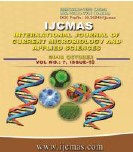


 National Academy of Agricultural Sciences (NAAS)
National Academy of Agricultural Sciences (NAAS)

|
PRINT ISSN : 2319-7692
Online ISSN : 2319-7706 Issues : 12 per year Publisher : Excellent Publishers Email : editorijcmas@gmail.com / submit@ijcmas.com Editor-in-chief: Dr.M.Prakash Index Copernicus ICV 2018: 95.39 NAAS RATING 2020: 5.38 |
Due to climate change, abiotic and biotic stresses like soil salinity, drought, pH, high temperature and plant fungal diseases are major threat of the agricultural crop production, reduces the growing demand of food of the population. To cope with adverse impact of such stresses, use of wide variety of synthetic chemical cause serious hazardous effects on environment, soil, water and human health. Use of microorganisms as a bioinoculants is a new green eco-friendly technology for sustainable agriculture production and can lessen the effect of these stresses. With this respect in the present study a dominant bacterial strain AH53 was isolated from barren agriculture soil of Uttar Pradesh, India for exploiting their unique plant growth promotion properties, tolerance to abiotic stresses, as well as antifungal activities against the fungal pathogens. The results of different level of abiotic stresses tolerance showed that strain AH53 was able to grow up to 14% NaCl, 30% PEG, between 20 to 50°C temperature and at pH 5–9. Further dual culture assay revealed that strain AH53 significantly inhibited mycelia growth of Sclerotium rolfsii and Fusarium avenaceum with inhibition rate of 86.59 and 85.15% respectively. The different modes of action for abiotic stresses tolerance and biocontrol activity of the strain AH53 was confirmed by production of multiple plant growth promoting and biocontrol determinants like production of indole acetic acid (125.24 ug/ml), siderophores, HCN, ACC deaminase,, solubilization of phosphate – zinc, production of hydrolytic enzymes and PCR amplification of antimicrobial peptides genes. The 16S rRNA gene sequencing and phylogenetic analysis identified the strain as Bacillus amyloliquefaciens. The results provide evidence that strain AH53 may contribute to its potential activity as mitigation of abiotic stresses, biological control of plants disease to enhancement of sustainable agriculture production under different stressful condition.
 |
 |
 |
 |
 |